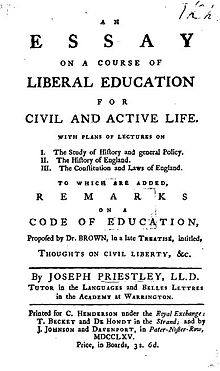Essay on a Course of Liberal Education for Civil and Active Life
- Essay on a Course of Liberal Education for Civil and Active Life
-
Essay on a Course of Liberal Education for Civil and Active Life est un traité d'éducation, publié en 1765, par le polymathe britannique Joseph Priestley[1].
Dédié au conseil d'administration de la Warrington Academy au sein de laquelle Priestley enseigne alors, l'ouvrage soutient que l'éducation des jeunes devrait anticiper leurs besoins pratiques, chose qu'il accuse aussi bien les universités dissidentes qu'officielles de ne pas faire.
Aux yeux de Priestley, se concentrer sur l'étude des classiques empêche les étudiants d'acquérir des compétences utiles. Ce principe d'utilité guide son choix d'un programmes, non conventionnel, destiné aux étudiants de la classe moyenne qui fréquentent Warrington. Il propose que les élèves étudient l'anglais et les langues modernes au lieu des langues classiques, apprennent les mathématiques, lisent l'histoire moderne, plutôt que celle de l'Antiquité, et étudient la constitution et les lois de l'Angleterre. Il estime que ces sujets prépareraient mieux ses étudiants, provenant de la classe moyenne des commerçants, à la vie qui les attend. Il ne pense pas que les pauvres doivent recevoir le même enseignement, faisant valoir « qu'il ne pourrait être d'aucune utilité pour leur pays et, souvent, un réel préjudice pour eux-mêmes »[2]. Le conseil est convaincu et, en 1766, la Warrington Academy remplace sa voie classique par celle des arts libéraux de Priestley[3].
Notes et références
- ↑ Priestley, Joseph. Essay on a Course of Liberal Education for Civil and Active Life. London: Printed for C. Henderson under the Royal Exchange; T. Becket and De Hondt in the Strand; and by J. Johnson and Davenport, in Pater-Noster-Row, 1765.
- ↑ Cité dans Sheps, 137.
- ↑ Thorpe, 52-4; Schofield, 124-5; Watts, 95-7; Sheps, 136.
Bibliographie
- (en) Robert E. Schofield, The Enlightenment of Joseph Priestley: A Study of his Life and Work from 1733 to 1773, University Park, Pennsylvania State University Press, 1997 (ISBN 0271016620)
- (en) Arthur Sheps, Lumen, vol. 18, 1999, « Joseph Priestley's Time Charts: The Use and Teaching of History by Rational Dissent in late Eighteenth-Century England », p. 135–154 .
- (en) Thomas Edward Thorpe, Joseph Priestley, London, J.M. Dent & Co.; New York, E.P. Dutton & Co., 1906 (OCLC 6129836)
- (en) R. Watts, Enlightenment and Dissent, 1983 (OCLC 8780129), « Joseph Priestley and Education », p. 83–100
Voir aussi
Lien externe
Catégories :
- Œuvre de Joseph Priestley
- Livre paru en 1765
Wikimedia Foundation.
2010.
Contenu soumis à la licence CC-BY-SA. Source : Article Essay on a Course of Liberal Education for Civil and Active Life de Wikipédia en français (auteurs)
Regardez d'autres dictionnaires:
Essay on a Course of Liberal Education for Civil and Active Life — (1765) is an educational treatise by the eighteenth century British polymath Joseph Priestley. [Priestley, Joseph. Essay on a Course of Liberal Education for Civil and Active Life . London: Printed for C. Henderson under the Royal Exchange; T.… … Wikipedia
Essay on the First Principles of Government — (1768) is an early work of modern liberal political theory by eighteenth century British polymath Joseph Priestley.Genesis of workPriestley s friends urged him to publish a work on the injustices borne by religious Dissenters because of the Test… … Wikipedia
Joseph Priestley and education — Joseph Priestley (OldStyleDate|March 24|1733|March 13 ndash; February 8 1804) was a British natural philosopher, Dissenting clergyman, political theorist, and theologian. While his achievements in all of these areas are renowned, he was also… … Wikipedia
Joseph Priestley and Dissent — Joseph Priestley (March 13, 1733 (old style) ndash; February 8, 1804) was a British natural philosopher, political theorist, clergyman, theologian, and educator. He was one of the most influential Dissenters of the late eighteenth century.A… … Wikipedia
Joseph Priestley — (13 March 1733 (Old Style) – 6 February 1804) was an 18th century British theologian, Dissenting clergyman, natural philosopher, educator, and political theorist who published over 150 works. He is usually credited with the discovery of oxygen,… … Wikipedia
Joseph Priestley — Pour les articles homonymes, voir Priestley. Joseph Priestley Portrait de Priestley par Ozias Humphrey … Wikipédia en Français
List of works by Joseph Priestley — This list of works by Joseph Priestley classifies all of the works by Joseph Priestley (1733 – 1804), a British natural philosopher, Dissenting clergyman, political theorist, theologian, and educator. He is best known for his discovery,… … Wikipedia
Liste des œuvres de Joseph Priestley — Priestley, paint à la fin de sa vie par Rembrandt Peale (vers 1800) Cette liste des œuvres de Joseph Priestley classifie tous les ouvrages de Joseph Priestley (1733 1804), philosophe naturel britannique, prêtre dissident, philosophe politique,… … Wikipédia en Français
Priestley, Joseph — born March 13, 1733, Birstall Fieldhead, near Leeds, Yorkshire, Eng. died Feb. 6, 1804, Northumberland, Pa., U.S. English theologian, political theorist, and physical scientist. He worked as a teacher and lecturer in various subjects before… … Universalium
Joseph Priestley — (* 13. März 1732jul./ 24. März 1733greg.[1] in Birstall bei Leeds, England; † 6. Februar 1804 in Northumberland, Pennsylvania, USA) war ein englisch amerikanischer Theologe des Unitarismus, Philosoph, Chemiker und Physiker.… … Deutsch Wikipedia
 Page de titre de Essay on Education de Joseph Priestley.
Page de titre de Essay on Education de Joseph Priestley.
